Pacific students and alumni making their mark on the world
Many Pacific students are already achieving their goals after studying at the University of Otago. Others are currently following their own learning journeys. Discover how the University and the Pacific Islands Centre helps students make their dreams a reality.
Read about students who chose:
Commerce
'Ema Latu
BCom
"Although the initial reality of being away from family can be daunting, the Pacific Islands Centre at Otago really is incredibly supportive.”
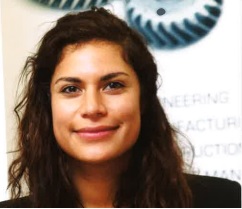 'Ema Latu expected a top-class education at the University of Otago but says she was pleasantly surprised to also find a support network that made the institution a “home away from home”.
'Ema Latu expected a top-class education at the University of Otago but says she was pleasantly surprised to also find a support network that made the institution a “home away from home”.
'Ema, who moved to Dunedin from Tonga during her high school years, says while Otago's reputation was a major attraction, family members had also recommended study there – her grandfather was a student in the late 1940s, and her brother was a recent student.
A highlight of study was involvement with the Pacific Islands Centre. “They were incredibly welcoming with frequent social activities and academic mentoring in small groups of students. The Centre provided academic guidance and support. There were barbecues and Kiriketi machines and on the morning of graduation the Centre put on a Pacific Islands breakfast. There was a real sense of community.”
During her studies, 'Ema was involved in events organised by the Centre, speaking at high schools to encourage Pacific Island pupils to consider tertiary study. She was also a member of the University's Student Commerce Society (OCOM). The International Business major offered the opportunity to pursue an interest in the study of language and culture in addition Commerce papers – the ability to participate in a student exchange was also appealing. Since graduating, 'Ema has worked a research assistant for the Department of Management and in a frontline support role at GBL Personnel Ltd, Wellington. More recently 'Ema has worked as a Business Support Officer for the Dunedin City Council, before travelling to Indonesia. “Although the initial reality of being away from family can be daunting, the Pacific Islands Centre at Otago really is incredibly supportive. On top of all that you get a top education from a world-renowned University; it's a once in a lifetime opportunity.”
Joseph Vuli (Fiji)
Accounting and French
“The University is right in the centre of the city, which means you are pretty close to everything.”
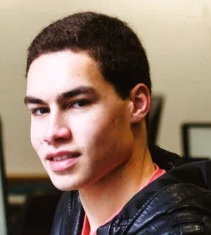 The notion that art and commerce don't mix carries little weight for Joseph Vuli.
The notion that art and commerce don't mix carries little weight for Joseph Vuli.
The first-year University of Otago student recently launched his study for a double degree – a Bachelor of Commerce majoring in Accounting and a Bachelor of Arts majoring in French. This well balanced diet of words and numbers offers him a lot of variety and stimulation he says.
“I'm enjoying it all really! My Business and Finance papers are really interesting, and my French classes are very practical – every week we get the chance to meet in groups and speak to one another in French, which is great.”
Born in Luxembourg and raised in Fiji, Papua New Guinea and New Zealand, Joseph has seen his fair share of the world but he says Dunedin is a uniquely rewarding place to live and study.
“The University is right in the centre of the city, which means you are pretty close to everything,” he says. “You can walk into town whenever you like and it's all quite handy.”
It has been a great place to meet people and make new friends, Joseph says, thanks to both the city's large student population and the University's dedicated support network for Pacific Islands students.
“The Pacific Islands Centre is a resource that all Pacific Islands students should check out,” he says. “Their tutorials are really helpful, but it's also a great place to go and have some food and have a chat. There's a nice little Pacific Islands community within the University community.”
William Marsters (Cook Islands Māori)
Economics and Finance
“I just can't picture myself anywhere else… It's a great place to study.”
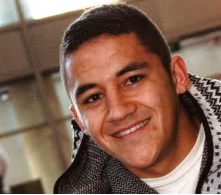 William Marsters does not hesitate when it comes to recommending his university experience to other students. “Put me in a room with anyone,” he says, “and I'll persuade them to come to Otago.”
William Marsters does not hesitate when it comes to recommending his university experience to other students. “Put me in a room with anyone,” he says, “and I'll persuade them to come to Otago.”
William's father is Cook Islands Māori, and his mother is New Zealand European. He went to school in Tauranga, but decided to study at Otago because he had heard others “singing its praises”. Now, he is only too happy to do the same. “I'm loving it here,” he says with a grin.
Studying in a different city gave William the chance to “branch away from home and into life”, an important step in gaining independence, he believes.
And here, the Otago “student lifestyle” has provided William with a positive way of discovering and fostering his passions, he says.
His aptitude with figures and interest in economy meant a commerce degree was the natural choice. William has since narrowed his focus to Economics and Finance, with a minor in Management.
Meanwhile, he flats with students he got to know while living in Knox College, commenting that many of the people he met there have become “lifelong friends”. His position as a football coach at Knox enables him to remain connected with the college, and provides good time out from his studies.
William intends to travel after he graduates, and may even life in the Cook Islands for a while, as he has family over there. However, he is certain that he will come back to New Zealand to work. “New Zealand is the place for me.”
But for now, William is enjoying making the most of his time at the University. “I just can't picture myself anywhere else… It's a great place to study.”
Health Sciences
Alapasita Teu
Physical Education
Tonga/Samoa
“Setting sail to study PE has been a thrilling and rewarding ride.”
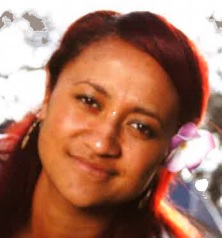 If Alapasita Teu has her way, there will be a lot of New Zealanders much like her in the future – Pacific Islanders who are fit, healthy and engaged in regular physical activity.
If Alapasita Teu has her way, there will be a lot of New Zealanders much like her in the future – Pacific Islanders who are fit, healthy and engaged in regular physical activity.
The University of Otago Physical Education student is passionate about promoting health lifestyles, and after completing her honours degree, specialising in Public Health, she intends to move into work doing just that in Pacific Islands and Maori communities.
“All the statistics we learn about in class seem to be stacked up against these communities,” Alapasita says. “Physical activity has had a really positive impact on my family's life, and I want to be part of ensuring that it can have a positive impact in these communities, which have limited access to health care and other resources.”
Alapasita's love of sport is nothing new – she has always been a keen netballer and played tennis competitively as a teenager. But her time at university has allowed her to refine her goals and gain invaluable new experiences, she says. The opportunity to do work experience at a Dunedin exercise prescription clinic and to tutor Pacific Islands high school students through the University's Pacific Islands Centre have been particular highlights, she says.
“Setting sail to study PE has been a thrilling and rewarding ride,” says Alapasita.” Having the opportunity to work in the field while you study means we have a real sense of what we are going to be doing out in the real world, and it has really exceeded my expectations. It's been a blessing and an amazing journey.”
Tarucilla Tatui (Niue)
Medicine
“I have so many opportunities, because I have been to the University of Otago.”
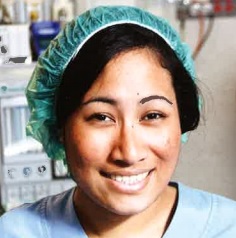 As a University of Otago medical student, Tarucilla is already making a difference – she is the first student from Niue to be accepted into Medical School as an undergraduate.
As a University of Otago medical student, Tarucilla is already making a difference – she is the first student from Niue to be accepted into Medical School as an undergraduate.
Studying Medicine at the University of Otago had always been Tarucilla's ambition. However, it was a dream she was initially too shy to share, because no one else from Niue had achieved this goal.
Nevertheless, she as determined to give it her best shot, and while she admits Health Science First Year was demanding, Tarucilla was thankful for the academic support she received from the Pacific Islands Centre. “I had to focused, disciplined, and committed to get to where I am now.”
Her dedication paid off, and Tarucilla describes her acceptance into Medical School as a “dream come true”. It feels good, she says, to make her family and her homeland proud.
This achievement means that Tarucilla is regarded as a “role model” back home, and her success has inspired other Niueans to enrol at the University.
Meanwhile, Tarucilla is also a diligent student leader of PIHPSA (the Pacific Islands Health Professional Students' Association), supporting other Pacific Islands students studying health professional courses to make the most of their time at the University of Otago, just as she has.
She highly recommends first year accommodation in a University residential college, “being surrounded by students who were studying hard motivated me to do the same.”
And now, when Tarucilla considers the years that lie ahead, she is filled with confidence. It is the clinical aspect of a medical career which most interests her; and she can't wait to start interacting with patients.
Further, “As an educated woman, I will have a stable future,” Tarucilla says. “I have so many opportunities, because I have been to Otago University.”
Humanities
Lani Alo
“The University's Pacific Islands Centre were really good at taking care of any questions in the early days.”
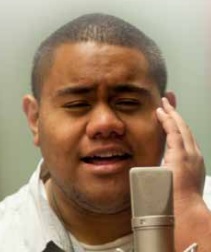 Music is one of the driving forces of Metitilani (Lani) Alo's life.
Music is one of the driving forces of Metitilani (Lani) Alo's life.
As an experienced vocalist and multi-instrumentalist, he finds Otago's Contemporary Music Performance degree a perfect fit.
At school in Auckland, where he was born and bred, he search for the right course and the right place to study.
“I was looking for more independence – home as too comfortable – and I felt growing up and doing my own thing would be good for me. I wanted the right course for the type of music that I do and that I want to do when I'm older, and I found that at Otago.”
Lani says he was influenced by an inspirational teacher who had graduated from the same course, and helped by having Samoan family connections in Dunedin.
“It's a long way from Auckland, so it was good to have a foundation here too, and the people at the University's Pacific Islands Centre were really good at taking care of any questions in the early days.”
Lani has also connected with the local Samoan church. “Although I'm doing contemporary work for my degree, I'm a classically-trained vocalist, so I'm still practising that with choral work with the church.”
He's also continuing to work with his church youth choir in Auckland when he can.
“It's all about keeping a balance. The contemporary course is perfect. I thoroughly enjoy it, and my first year at university wasn't as stressful as I thought it might be.
“Student life really is what you make it. You can stay home or get out and meet new people and do things, which is easy in Dunedin, as it is a small place compared with Auckland.
“Everyone in Dunedin is so friendly, and as students are such a big part of the population people relate to each other easily.
If you are thinking of coming from outside to Dunedin, I strongly encourage you to make the leap and everything else will sort itself out. Just make the move. You won't regret it.”
Irene Hundleby
PhD – Music
“Otago's Pacific Island Centre is fantastic and is a great help to connect students.”
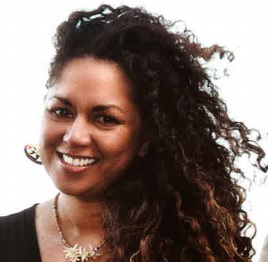 For Irene Hundleby, the PhD she is about to embark on is just part of her journey into the musical tradition of her Solomon Island roots.
For Irene Hundleby, the PhD she is about to embark on is just part of her journey into the musical tradition of her Solomon Island roots.
From Malaita on her mother's side, and New Zealand on her father's, Irene will spend the next three years researching the music of women in the Lau Lagoon, Solomon Islands.
“It's something I've been aiming towards for about 10 years. This research is close to my heart and something I am passionate about, and as such, it has more significance to me than the PhD alone.”
Irene began her study into this area of music through her dissertation as part of her Bachelor of Music (Honours) degree at Otago in 2013.
While that looked at traditional music from the 1960s to 2012, her PhD will be part conservation of culture and preservation of knowledge, and part analysis of Malaitan women's music.
“For me, it has a myriad of potential opportunities. I hope to support Pacific Island research, to break ground in a new area of research – no one has studied women's music from the Solomons before – as well as contribute to my community and give a voice to my people.”
Irene was raised in Auckland and started her academic career studying science.
In the early 2000s she began a career in neuromuscular therapy and then moved to Dunedin for love, but always knew she wanted to continue to study and eventually chose music.
“Music was always an important part of my life and for a while there was a tug-of-war between my love of science and music.”
When she moved south she found a “really supportive community” of locals with roots in Vanuatu, Papua New Guinea and the Solomon Islands.
“There are very few students who come to Dunedin from that area of the Pacific, and it can be very lonely if you're on your own. Otago's Pacific Island Centre is fantastic and is a great help to connect students to other groups as well as providing a sense of unity for Pacific Island students.
That's one of the joys about Dunedin – thanks to the University it's multicultural and a large number of people from lots of different places have made a home here.”
Clara Pau
Master of Indigenous Development
He Kura Matanui
“At postgraduate level you are more a master of your own destiny.”
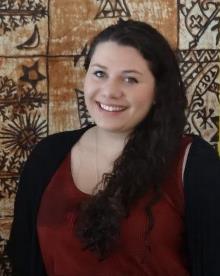 Raised in Alexandra, Central Otago, among the tussocks and the schist, Clara Pau didn't have a long journey to the University of Otago.
Raised in Alexandra, Central Otago, among the tussocks and the schist, Clara Pau didn't have a long journey to the University of Otago.
Her path since, however, has been a winding one.
Her love for science and equal passion for English have taken her in different directions and she is now following a third love – Indigenous Development/He Kura Matanui.
With an honours degree in English and a bachelor's degree in Botany already under her belt, she is now using her Master of Indigenous Development/He Kura Matanui to examine how New Zealand-born Samoans express their ethnic identities.
“It's highly autobiographical, which is why it's so powerful for me.” she says of her one-year research degree.
As one of few Pacific Islanders growing up in the small rural town, she says the idea of sometimes fitting in with two ethnicities, but also fitting in with neither, affects her often and she is curious how her experiences differ from her non-New Zealand-born Samoan friends, if they do at all. Clara has found the change to postgraduate study after two undergraduate degrees empowering.
“At postgraduate level you are more a master of your own destiny. You do have to put in the hard yards, but it's really rewarding.”
Working with a supervisor rather than a distant lecturer is also a pleasure, she says.
“As a postgrad you have to come out of your shell a bit and know when to ask for help. It's a really nice mixture of professional and personal with my supervisor. Both supervisors I have had are full to the brim with knowledge and ideas about their subject areas. I couldn't have come this far without them, always helping me to develop my own ideas and thinking around not just my topics, but my hopes and aspirations.”
Clara, who has been assisted by several scholarships during her time at Otago and is grateful for the assistance she has had from the Pacific Islands Centre on campus, says she plans to travel after completing her master's.
A PhD is “definitely” part of her future, although in which of her passions she's not sure.
“I really want my time at University to transcend academia. A reason I came here was because of the people who made it possible and who encouraged me, and if I can do something which encourages and enables others then I will be very happy.”
Sciences
Patila Malua Amosa (Samoa)
Chemistry
“I'm very impressed by the resources and services available to students here.”
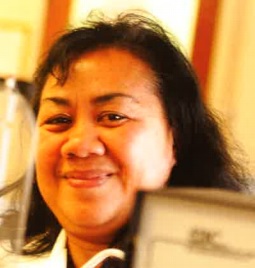 The danger posed to small pacific nations by rising sea levels is well known and often discussed, but this is not the only effect of climate change that is pertinent for Pacific Islanders.
The danger posed to small pacific nations by rising sea levels is well known and often discussed, but this is not the only effect of climate change that is pertinent for Pacific Islanders.
The Samoan environmental scientist and academic Patila Malua Amosa has moved from the South Pacific to the deep south to study the chemistry of ocean acidification at the University of Otago, examining the ongoing effects of this global warming-related phenomenon on marine life.
Patila, who normally lives in Samoa, but travelled to Dunedin to do her master's in Environment Science several years ago, says it's great to be back in Dunedin and starting her PhD.
“I love Otago.” she says. “I had a great experience here during my master's study and that continues today. It can be difficult to transition from full-time work to full-time study, but the staff here are very welcoming and helpful.”
Full-time work for Patila in Samoa means her role as Head of Science and Biology Lecturer at the National University of Samoa, in addition to moderating secondary school examinations and co-ordinating workshops on disaster management.
Next to all of this, PhD study almost seems like it might be a relaxing sabbatical – a notion she laughs off.
“My work at Otago is challenging and rewarding,” she says. “In Samoa we just don't have the kind of equipment we would need to do this kind of research. I'm very impressed by the resources and services available to students here.”